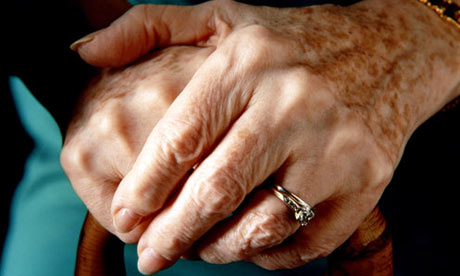|
In Beveridge's Footsteps - Making Care Free For All
A National Care Service will be a radical Labour initative to rank with the NHS and welfare state
By Andy Burnham, The Guardian
March 30, 2010
United Kingdom

The National Care Service will save families from having to pay for elderly relatives who need support. Photograph: Jeffrey Coolidge/Getty Images
Now more than ever, Britain needs an invigorating election campaign that takes politics back to what it should be – a clash of ideas, a choice of values. In these pages on Saturday John Harris suggested that Labour's "dysfunctional relationship with its past", and a battle between old and new Labour, is standing in the way of a bold approach.
Not so. Ed Miliband is preparing a manifesto with radical ideas that, like all Labour's best social reforms down the decades, are not a choice between old and new Labour but a synthesis of the best instincts of both.
The National Health Service, the Open University, the national minimum wage, Sure Start – all policies true to Labour's roots but also speaking directly to the aspirations of the fair-minded majority.
And today we launch a policy which I believe is in the same tradition, of the same magnitude and with all the hallmarks of the best of Labour.
A new National Care Service, providing personal care and support to adults on the basis of need and free at the point of use, will ensure that an ageing society remains a decent and fair society.
It speaks directly to the aspirations of millions of families who want good quality care and support when they need it without the fear of losing their homes or their savings.
The social care system is the only remaining part of our welfare state that is not organised on a collective, population-wide, risk-sharing basis. When the welfare state was created, life expectancy was 12 years shorter. But, as we live longer, a sixth giant has emerged to add to Beveridge's five – fear of old age.
Many older people today experience a real anxiety about the costs and quality of care. Too often they simply don't know what the future holds for them as they get old and frail.
That's because we currently have a random dementia tax – where people can see tens or hundreds of thousands of pounds wiped out by the costs of care, the loss of their homes, their savings and every ounce of their financial security.
And, because we have an overstretched care system, it doesn't provide the dignity that all deserve. Families can face a wearying battle to get help and often find that it falls short. If we fail to reform this system now, unfairnesses will only intensify over the next decade.
Today's generation of pensioners are the first real home-owning generation. They rightly want to help their children and grandchildren; but their ability to do so is at risk in the cruel care lottery.
To make the National Care Service work, everyone will have to make a contribution. But because of this, the costs of covering everyone's care needs will be reduced. This means people of all incomes will get peace of mind in old age and be able to protect everything they have worked for. Like the NHS before it, it will end catastrophic care costs.
It is a policy that will promote social mobility, helping lower-income families keep their foothold on the property ladder. It is also an economic policy. Most of us can expect to be carers in later life and will need high-quality support and control over services if we are to make balancing work and caring possible.
But, most importantly, it will promote a more positive vision of the ageing society, where older people are not always spoken of as a burden and can look forward to a retirement with peace of mind.
So this is a big choice for the country. It will require tough choices. Today I will propose reform in stages with a freeze on inheritance tax allowances for the next five years to begin this process, as well as moves to encourage more to work after 65.
It is unquestionably a major reform, and we need to continue to build a consensus around it. I will be asking the Tories again today to open their minds to the possibility of a comprehensive system. That's because it is clear to me that any voluntary system will not provide the long-term solution that the country is looking for. It is more expensive, pricing out many people in the middle and bottom third.
The future of care of older people brings the clash of ideas that this election desperately needs. As this is one of the biggest issues the country faces, it is right that it will at last be centre-stage in an election campaign.
There are, of course, risks for Labour in proposing the comprehensive, compulsory approach – but now is the time for strong hearts.
The National Care Service shows Labour still has the courage, confidence and capacity to shape a new century and a fairer society.
More
Information on World Health Issues
Copyright © Global Action on Aging
Terms of Use |
Privacy Policy | Contact
Us
|



